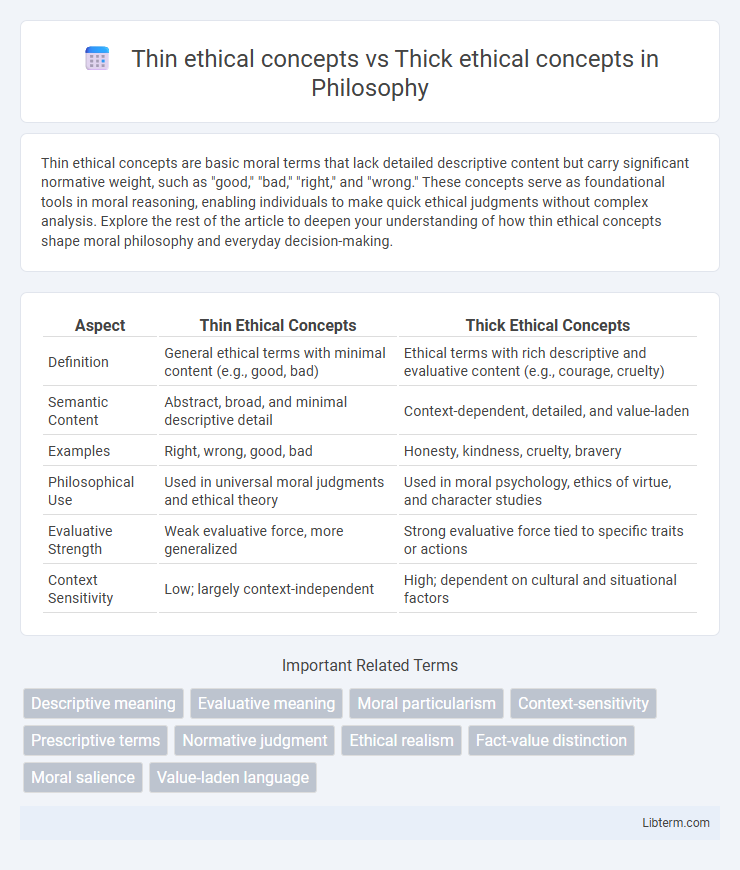Thin ethical concepts are basic moral terms that lack detailed descriptive content but carry significant normative weight, such as "good," "bad," "right," and "wrong." These concepts serve as foundational tools in moral reasoning, enabling individuals to make quick ethical judgments without complex analysis. Explore the rest of the article to deepen your understanding of how thin ethical concepts shape moral philosophy and everyday decision-making.
Table of Comparison
| Aspect | Thin Ethical Concepts | Thick Ethical Concepts |
|---|---|---|
| Definition | General ethical terms with minimal content (e.g., good, bad) | Ethical terms with rich descriptive and evaluative content (e.g., courage, cruelty) |
| Semantic Content | Abstract, broad, and minimal descriptive detail | Context-dependent, detailed, and value-laden |
| Examples | Right, wrong, good, bad | Honesty, kindness, cruelty, bravery |
| Philosophical Use | Used in universal moral judgments and ethical theory | Used in moral psychology, ethics of virtue, and character studies |
| Evaluative Strength | Weak evaluative force, more generalized | Strong evaluative force tied to specific traits or actions |
| Context Sensitivity | Low; largely context-independent | High; dependent on cultural and situational factors |
Definition of Thin Ethical Concepts
Thin ethical concepts are basic evaluative terms such as "good," "bad," "right," and "wrong" that convey moral judgments with minimal descriptive content. These concepts provide a general sense of approval or disapproval without specifying the reasons or context behind the judgment. Unlike thick ethical concepts, thin ethical concepts lack detailed information about specific actions or qualities, serving primarily as fundamental tools for moral evaluation.
Definition of Thick Ethical Concepts
Thick ethical concepts combine descriptive and evaluative elements, conveying both factual information and moral judgment simultaneously. These concepts, such as honesty and cruelty, provide insight into actions or character traits while inherently expressing approval or disapproval. Their dual nature allows thick ethical concepts to enrich ethical discussions by linking empirical reality with normative assessment.
Historical Background of Ethical Concepts
Thin ethical concepts, such as "good" and "right," have ancient roots in classical philosophy, appearing prominently in the works of Socrates and Plato as basic evaluative terms. Thick ethical concepts, combining descriptive and evaluative aspects like "justice" and "courage," gained prominence in Aristotelian ethics, emphasizing character and context in moral judgments. The historical evolution from thin to thick concepts reflects a shift from abstract moral principles to more nuanced understandings of ethical behavior embedded in social and cultural realities.
Key Differences Between Thin and Thick Concepts
Thin ethical concepts such as "good" and "bad" are abstract, general, and purely evaluative without providing detailed descriptive content. Thick ethical concepts like "courageous" and "cruel" combine evaluative judgment with specific descriptive information, making them contextually rich and informative. The key difference lies in thin concepts' minimal descriptive content versus thick concepts' integration of moral evaluation and factual description.
Examples of Thin Ethical Concepts
Thin ethical concepts include fundamental terms such as "right," "wrong," "good," and "bad," which provide a basic evaluative framework without specific contextual details. These concepts serve as universal moral signposts applicable across diverse situations, guiding ethical judgment in a broad, abstract manner. For instance, calling an action "wrong" signals disapproval without specifying the reasons or circumstances, contrasting with thick concepts that combine descriptive and evaluative elements, like "cruel" or "generous.
Examples of Thick Ethical Concepts
Thick ethical concepts blend descriptive and evaluative meanings, offering rich moral insights beyond mere labels like "good" or "bad." Examples include honesty, courage, cruelty, and kindness, which convey specific behaviors while inherently judging their moral worth. These concepts facilitate nuanced ethical discussions by linking actions directly to values and societal norms.
Role of Context in Thick and Thin Concepts
Thin ethical concepts such as "right" and "wrong" are context-independent, providing broad moral judgments without detailed situational information. Thick ethical concepts like "courageous" and "cruel" inherently combine descriptive and evaluative elements, relying heavily on contextual factors to convey precise moral meaning. The role of context is crucial in thick concepts as it shapes the understanding of behavior by integrating factual circumstances with ethical evaluation, whereas thin concepts maintain abstract moral standards applicable across diverse situations.
Importance in Moral Philosophy
Thin ethical concepts, such as "good" and "bad," provide universal evaluative standards crucial for cross-cultural moral analysis, while thick ethical concepts like "courageous" and "cruel" combine descriptive and evaluative elements essential for contextual moral understanding. The distinction is important in moral philosophy because thin concepts enable foundational ethical judgments applicable across diverse contexts, whereas thick concepts facilitate nuanced assessments tied to specific cultural and social practices. This balance deepens ethical inquiry by integrating both abstract principles and concrete moral experiences.
Criticisms and Debates Surrounding the Distinction
Thin ethical concepts such as "good" and "right" are often criticized for being too abstract and lacking context, while thick ethical concepts like "courageous" and "cruel" provide richer descriptive and evaluative content but risk cultural bias. Debates highlight that the strict separation oversimplifies ethical language, as many argue that thin concepts carry implicit normative content and thick concepts involve general moral principles. Critics also contend that the distinction fails to capture how people actually use ethical terms in real-life moral reasoning, suggesting a more integrated approach is necessary.
Implications for Ethical Decision-Making
Thin ethical concepts like "good" and "bad" offer broad moral guidance but lack specific context, making them less effective for nuanced ethical decision-making. Thick ethical concepts, such as "courage" or "cruelty," combine descriptive and evaluative elements, providing richer context that enhances clarity and precision in moral judgments. Incorporating thick concepts into decision-making processes allows for deeper understanding of actions and motives, improving ethical evaluations in complex situations.
Thin ethical concepts Infographic

 libterm.com
libterm.com